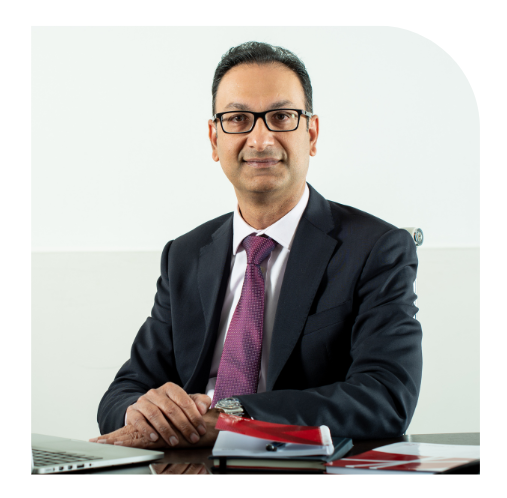Private giving from all countries around the world is on the rise, says Assad Abdullatiff, Managing Director at Axis Fiduciary Ltd, who spoke recently at Mauritius Finance and Investment Week at Dubai Expo 2020, and this has created a new space for a whole range of professional services around charity and philanthropy. He emphasises that Mauritius offers not only the right legal vehicles to accommodate philanthropic ventures but also a number of other advantages through its conducive business ecosystem.

You have recently participated in Mauritius Finance and Investment Week at Dubai Expo 2020 and spoke in the Business Forum on private banking and wealth management. What is your view of the wealth management landscape in Mauritius currently, and what are some of the advantages of using the jurisdiction?
Mauritius has been proactive in furthering its position as a wealth management centre of choice for this part of the world. It is a recognized IFC of substance, well-regulated and supportive of all international initiatives (OECD/FAFT/G20). It has an excellent palette of products for the private wealth management industry such as trusts, foundations, private trust companies and family offices. It has the necessary breadth and depth to provide the whole range of associated professional services to private clients through Management Companies, Independent Advisors, Banks, Law Firms and Asset Managers. Last but not least, Mauritius offers a neutral tax base for High Net Worth Individuals to establish their estate planning structures, no CGT, no withholding taxes, confidentiality and free repatriation of profits and capital. It is therefore a jurisdiction which cannot be overlooked in the context of asset protection, estate planning and wealth management.
You have highlighted that philanthropy is an area of potential focus for Mauritius in the future. What trends are you seeing in the philanthropy space globally?
The interest in philanthropy across the world has been on the rise. This is due to the explosion in global wealth over the last couple of decades and is fuelled by a desire by those who have benefited from economic expansion to make a difference to society at large. But philanthropy is not limited to the super rich. With the advent of technology, there is now more general awareness of the complex problems of our time and simple ways of channeling funds to worthy causes. Social media in particular has been instrumental in raising awareness and in promoting solidarity around a movement. Crowdfunding, through websites tailored to showcase specific projects or causes and accept donations seamlessly, has allowed the raising of money with donations from a large number of people for worthy causes.
How is modern philanthropy evolving, in your view?
In recent years, we have been witnessing the professionalization of philanthropy, which means that philanthropists are increasingly adopting business-like techniques and standards to make sure that they are able to appeal to donors. This means that they need the right vehicle for their philanthropy/investment initiative, t0 demonstrate good governance, professional management of funds, show how impact is measured and report to their donors/investors. That is where the use of an appropriate jurisdiction from which to conduct the philanthropy project can have all its importance.
What role can Mauritius play in the establishment and administration of philanthropic structures?
Mauritius is an ideal jurisdiction for the establishment and administration of philanthropic structures. It offers the following vehicles, which are all exceptionally well suited to supporting philanthropic ventures:
Philanthropic Trusts
The Mauritius Trust has all the attributes for use in philanthropy. A trust can be specifically structured as a charitable trust so long as the trust has as its exclusive purpose or object one or more of the following:
- the relief of poverty;
- the advancement of education;
- the advancement of religion;
- the protection of the environment;
- the advancement of human rights and fundamental freedoms;
- any other purpose beneficial to the public in general.
Philanthropic activities would normally fall under one of the above purposes but even if they do not, the law allow allows a trust to be established for non-charitable purposes.
Every trust set-up in Mauritius must have at least one Qualified Trustee which is defined as a person specifically licensed or authorised by the Financial Services Commission of Mauritius. This ensures that all trusts are professionally managed, supervised, and subject to the AML/CFT framework.
Trustees have a number of statutory duties, including fiduciary duties, duty in respect of the trust property, duty to act together in case there is more than one trustee and duty to act impartially. In particular, Trustees must keep updated and accurate accounts and records of their trusteeship.
Philanthropic Foundations
Alternatively, a philanthropic initiative may be undertaken through a Foundation. There are a number of similarities between trusts and foundations, but the main difference is that a foundation is a legal entity in its own right and can therefore own assets directly. It may therefore be preferable to those clients who prefer to use a vehicle which has a legal personality.
In the context of philanthropic activities, similar to a trust, a foundation can also can be specifically structured as a charitable foundation so long as its exclusive purposes or objects are charitable. The definition of ‘’charitable objects’’ is similar to that of trusts. Similarly, if the specific philanthropic activity does not fall under one of the defined charitable purposes, the law allows a foundation to be established for non-charitable purposes.
A Foundation is managed by a Council which carries out the objectives and purposes of the Foundation. The law requires all foundations to have at least one council member resident in Mauritius. To ensure that foundations are professionally managed, supervised, and subject to the AML/CFT framework, every foundation must also have a qualified secretary in Mauritius which is defined as a person specifically licensed or authorised by the Financial Services Commission of Mauritius.
Taxation of Philanthropic Trusts/Foundations
Both the charitable trust/charitable foundation are exempt from income tax in Mauritius whereas a non-charitable trust/foundation of which the settlor/founder is a non-resident of Mauritius and the purposes for which it has been set-up are conducted outside of Mauritius can make a declaration of non-residence which will also render it not to be subject to income tax in Mauritius.
What attributes does Mauritius have to offer to those considering setting up philanthropic structures on the island?
Stability: Mauritius is a worldwide reference for political stability in this side of the world with a presidential democracy modeled on the British parliamentary system with the highest court of appeal being the Privy Council of the United Kingdom.
Regulatory framework: Philanthropists will benefit from operating in a well-regulated jurisdiction which is supportive of international initiatives (FATF, Basel, IOSCO, IAIS) aimed at preventing the jurisdiction from being used for money laundering and terrorist financing. The two regulators for the Financial Services Sector, namely the Financial Services Commission and the Bank of Mauritius are dedicated to the supervision of the bank and non-bank financial services sector.
Expertise: As a leading International Financial Services Centre, Mauritius has developed a fine brand of diligent, educated, multilingual and experienced network of specialists in wealth management, private banking, law and accounting. It has a burgeoning branch of STEP which is the leading global professional body of practitioners specializing in inheritance and succession planning. STEP members are well versed in helping clients to support charitable causes in an effective way.
The investment corridor to Africa: Mauritius is widely heralded as the “Gateway to Africa” and is already playing a pivotal role in facilitating investments in Africa. it is already trusted by institutional investors, development financial institutions, family offices and other investors who find it to be the natural domicile for investment into Africa.
What opportunities do you see for Mauritius to become the jurisdiction of choice for philanthropic ventures targeting Africa?
Private giving from all countries around the world is on the rise and this has created a new space for a whole range of professional services around charity and philanthropy. Mauritius offers not only the right legal vehicles to accommodate philanthropic ventures but also a number of other advantages through its conducive business ecosystem. It also has a clearly articulated Africa strategy with strong historical, cultural and geographical links with Africa. There is therefore no reason why Mauritius cannot become a jurisdiction of choice for the structuring and professional management of charitable and philanthropy activities aimed at Africa.
